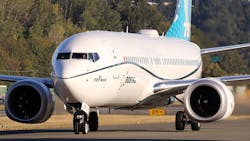Southwest Cancels More Flights as Boeing 737 Max Remains Grounded
Southwest Airlines is canceling more flights amid ongoing uncertainty about when the Boeing 737 Max will be allowed to begin flying again.
The three major U.S. airlines that fly the Max — Southwest Airlines, United Airlines and American Airlines — were planning to ramp up the number of Max jets in their fleets, with orders for dozens more aircraft from Chicago-based Boeing in the coming years. . But the manufacturer stopped delivering new Max jets after the aircraft was grounded in March after crashes in Indonesia and Ethiopia that killed a total of 346 people. Boeing said Monday it would suspend production of the Max starting in January.
That means airlines are having to do without more aircraft they expected Boeing to deliver by the end of the year.
At the time, Southwest was flying 34 Max jets, which represents about 5% of the airline’s fleet. It expected to have a total of 75 by the end of the year, with more on the way in 2020, said Southwest spokesman Chris Mainz.
That has made shuffling aircraft to cover for the Max’s absence more difficult, he said.
Southwest announced Tuesday it would push back the earliest date it could resume flying the Max by five weeks, to April 13.That will require pulling about 300 flights a day from its schedule, up from about 100 flights it took off its daily schedule in June. On a peak day, Southwests operates more than 4,000 flights.
Southwest, whose entire fleet is made up of Boeing 737s, didn’t retire as many aircraft as it planned in 2019 and will likely do the same next year, but it hasn’t been enough to replace the missing Max jets, Mainz said.
“It’s one lever we can pull, but it’s not close to making up the difference,” he said.
In October, Southwest reported the aircraft’s grounding had reduced operating income by approximately $435 million as of Sept. 30.
Last week, Southwest said it reached a confidential agreement with Boeing to compensate Southwest for some of the financial damages related to the grounding of the Max. Southwest said about $125 million from that settlement would be shared with employees through the airline’s profit-sharing program.
American already pulled Max flights from its schedule through April 6 and said last week it expected to cancel about 140 flights per day. The airline has 24 Max jets and had expected another 16 to arrive in 2019, with 60 more on the way in 2020 and beyond.
United has not announced any changes to its plans for the Max since November, when it said it would not resume flights until at least March. At the time, United said it expected to cancel about 75 flights a day in December, during the busy holiday travel season, and about 56 a day starting in January.
United has the fewest Max aircraft among U.S. carriers. It had 14 planes when the Max was grounded in March and expected to get 16 more this year.
The airline has ordered 155 more that are scheduled to be delivered in 2020 or later, which means the full impact will depend on how long it takes for flights and production to resume.
All three airlines said they adjust their schedules to try to minimize the impact on passengers’ travel plans and work with customers on canceled flights find other flight options.
Boeing has said it will determine later when it will restart production, based largely on approval from government regulators.
“We believe this decision is least disruptive to maintaining long-term production system and supply chain health,” the company said Monday.
Investigators have found that flight control software designed to stop an aerodynamic stall was a major factor in the crashes, and Boeing is updating the software, making it less aggressive. But regulators have yet to approve the changes.
The Federal Aviation Administration said Monday it wouldn’t comment on Boeing’s business decisions, and that it has no set time frame for when work to recertify the Max to fly will be completed.
Boeing said it won’t lay off any of the 12,000 workers at its Renton, Washington factory “at this time," and many could be diverted to plants elsewhere in the Seattle region. Some could also be assigned to work on the 400 jets that Boeing has built since the Max was grounded in March but couldn’t be delivered.
The long-term grounding has put Boeing in a difficult position, said Joe Schwieterman a DePaul University professor who is an aviation expert. The plant shutdown will help Boeing conserve cash, but it also will disrupt the network of about 900 companies that supply parts for the Max and other 737 models, Schwieterman said.
The shutdown will cost the company economies of scale gained by producing large numbers of planes. But by continuing to produce the grounded jets, Boeing was forced to store them on the ground as they depreciate because they can’t be delivered.
"The airlines certainly aren’t going to pay for planes until they’re ready for flight. So Boeing is really between a rock and a hard place here,” Schwieterman said.
———
©2019 the Chicago Tribune
Visit the Chicago Tribune at www.chicagotribune.com
Distributed by Tribune Content Agency, LLC.
